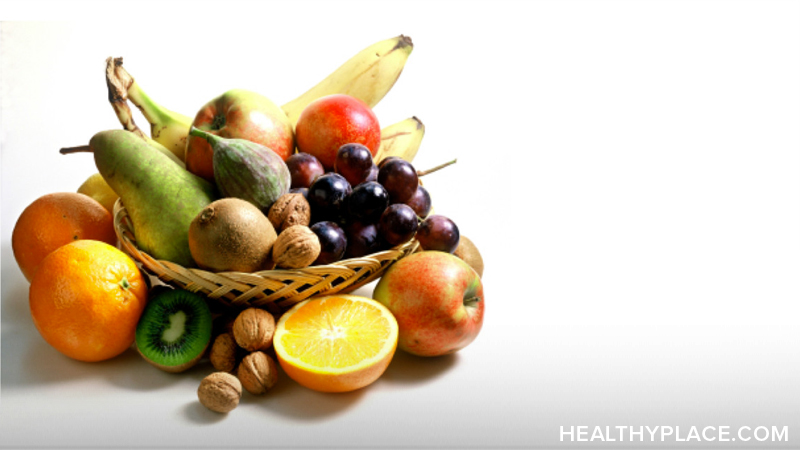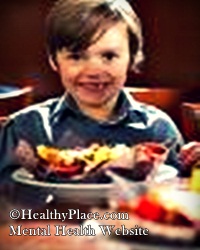ADHD Diet

Some people believe ADHD and other psychiatric disorders are linked to diet and by eliminating certain foods or adding others, it may reduce or eliminate ADHD, depression or other symptoms.
ED. NOTE: You should never stop, add, or change any medication or any treatment without first talking with your child's doctor.
The day my daughter refused to eat even her favorite food—peanut butter and honey on toast—was the day I lost it. Bursting into tears, I pulled open the medicine cabinet and swept all three of the medications she was taking into the trash.
Linnea, then seven, had spent the previous year on three different powerful psychotropic drugs, one after the other, as we waged a desperate battle to control her stuttering and the facial tics that went with it. Not only did the medications (a tranquilizer, a blood pressure drug prescribed off-label, and an antidepressant) leave her tics as rampant as ever, they caused a host of side effects including depression, lethargy, and an almost complete loss of appetite.
Always a skinny girl, Linnea had become thinner and thinner, at one point dropping below 50 pounds. And I had become a drill sergeant, standing over her while she tried to eat, alternately commanding and cajoling as I measured the circumference of her tiny arms with my eyes. Instead of the medications controlling her tics, it seemed that her tics were controlling us.
So into the wastebasket went the bottles of clonazepam and clonidine and desipramine, and off I went into full research mode. There must be something out there, I thought, that can help my daughter without wreaking such havoc on her young body.
Searching for Nutritional Therapies
Here is a truth about the parents of a child with a disability: We are relentless. Nothing fuels determination like listening to your child cry herself to sleep at night, or hearing her ask, yet again, if she'll ever be able to talk like other kids. Doctors and schools characterize us as demanding and difficult—yep, it's true. We will do anything—anything—to help our suffering children lead a normal, happy life. And yes, this dedication makes us easy targets for all the hucksters and charlatans out there touting the latest miracle in a bottle. But it also makes us powerful advocates, unshakable in our pursuit of the breakthrough that might make all the difference to the child we love.
It had been a long road up to this point. Linnea first started stuttering when she was just three, and the problem has become progressively more severe, characterized by what are called complete blocks—when her throat closes up and she gets trapped in a tense, tight-throated silence. As she struggles to get her words out, she goes into a multitude of tics—grimacing, blinking, throwing her head to one side. It is disconcerting and disturbing; even those who love Linnea dearly sometimes have to avert their eyes when she is trying hard to talk.
 Shortly after the peanut butter incident, I sat down at my computer, cruised some email newsgroups, and discovered a vast and hugely knowledgeable resource: my fellow parents of kids with behavioral disabilities. I quickly learned from these dedicated people that there are nondrug treatments that can make a real difference for children with disorders like Linnea's. It was a vast relief to hear from parents who'd watched their kids fail in school, fail to make friends, even suffer from violent outbursts, and then find some measure of peace.
Shortly after the peanut butter incident, I sat down at my computer, cruised some email newsgroups, and discovered a vast and hugely knowledgeable resource: my fellow parents of kids with behavioral disabilities. I quickly learned from these dedicated people that there are nondrug treatments that can make a real difference for children with disorders like Linnea's. It was a vast relief to hear from parents who'd watched their kids fail in school, fail to make friends, even suffer from violent outbursts, and then find some measure of peace.
A number of the most helpful strategies focus on dietary changes and nutritional therapy. Many alternative-minded experts in the field of brain-related disorders believe nutrition offers a promising avenue of treatment that's all too often been overlooked.
"The more we learn about the brain, the more we understand how nutrition and supplements can affect its functioning, including moods, attention, and cognition," says Lewis Mehl-Madrona, a psychiatrist at the University of Arizona in Tucson. What a child eats, he says, can profoundly affect the way her brain works. And this is true not just in the case of stuttering and tics, but for attention deficit hyperactivity disorder (ADHD), obsessive-compulsive disorder, autism and its related disorders, and many other behavioral and learning problems.
"All of these conditions are caused by a deficiency in neurotransmitters," says Billie Sahley, a behavioral therapist who directs the Pain and Stress Center in San Antonio, Texas. "That's what it all boils down to."
In the case of autism spectrum disorders and ADHD, many parents report great success with a gluten-free, casein-free (GFCF) diet that cuts out milk and wheat. Another common starting point for hyperactive kids is the Feingold diet, which bans artificial flavors, colors, and some preservatives.
Though therapies like these are largely under the radar of conventional medicine—neither my daughter's pediatrician nor her neurologist ever mentioned them—many have been shown, in well-documented research, to be quite effective. At least two wide-ranging reviews of existing research, one conducted by the Center for Science in the Public Interest and the other published in the Journal of Paediatric Child Health, have found that diet and nutritional therapy can noticeably affect some children's behavior. More specifically, a study of 20 children with ADHD published in the Alternative Medicine Review found a regimen of supplements to be as effective as Ritalin. And research among a group of 26 kids (also with ADHD) at Cornell Medical Center in New York found that three quarters responded well to a diet that eliminated several problem foods.
The connection between allergies and behavioral disorders can be confusing to parents; how could a sensitivity to dairy products cause a child to be hyper, spacey, or subject to tics? But the chemical released when we have an allergic reaction acts like a neurotransmitter, says Mary Ann Block, author of No More ADHD and an osteopathic doctor practicing in Dallas. "One neurotransmitter out of balance sets off a chain reaction that can cause all sorts of changes in behavior."
In addition to allergic reactions and sensitivities, many kids with ADHD, autism, Tourette's syndrome, and other disorders have been found to suffer from dramatic deficiencies in certain nutrients, including magnesium, omega-3 fatty acids, and B vitamins. Studies often document the deficiencies without looking at the treatment, but researchers have recently begun following up to see if replacing these missing nutrients can correct behavior problems. In one recent study of 400 ADHD children, for instance, zinc supplements beat placebos in treating certain aspects of the disorder, including hyperactivity and impulsivity.
Trial and Error with Dietary Treatments
But here's the tricky thing: What works for one child will not necessarily work for another. Since behavioral disabilities—and the brain chemistry imbalances that cause them—are so complex, parents who opt for dietary treatments must be prepared for a long, frustrating process of trial and error. "For some kids, all you have to do is shift one element of their diet. For others, you might have to do several things," says Mehl-Madrona. The payoff can be huge, though; instead of a child who may have to take medication for years to control symptoms, many parents wind up with something closer to a cure.
Kathy Langer of Illinois has spent the past ten years pursuing alternative treatments for her son DJ, now 23, who suffers from ADHD and pervasive developmental disorder, an autism-related condition, as well as depression. At 12, DJ was taking a mind-boggling assortment of medications, from lithium and Prozac to Mellaril and clonidine. "But we weren't seeing any improvement, and the side effects were horrible," says Langer.
Then one day she saw Doris Rapp, a Scottsdale, Arizona, allergist, pediatrician, and pioneer of the dietary approach, on the Donahue show, and heard testimonials from parents who swore her allergy-elimination techniques worked miracles for their kids. Right away, Langer consulted Rapp's colleague Billie Sahley, who tested DJ and diagnosed him with a severe allergy to dairy products and an amino acid deficiency.
Within months of starting a dairy-free, sugar-free diet and a regimen of amino acids and other supplements, DJ went off medication for the first time in years. "It's easy to get discouraged because it takes a while to see an improvement," says Langer, "and yes, it's a lot of work. But before, you couldn't reason with DJ. Now, even when he's upset, you can still talk to him. It's made all the difference in the world."
Zeroing In on Diet
For many parents, the thorniest question is where to begin. The answer is, not surprisingly, that depends. If you have any reason at all to think your child has food allergies—if, for example, he had to drink soy formula as a baby or had recurrent ear infections as a preschooler—then that's the logical place to start, say Mehl-Madrona and other experts.
If you already suspect a particular allergen, you can try to diagnose it yourself with the "single food elimination" method. Let's say you suspect milk may be the problem. Make sure your child eats no dairy products for four to seven days, watching him carefully to see if his symptoms improve. Then, on the final day, when your child has not eaten for at least three or four hours, give him nothing but the potential allergen (milk and cheese, for example). If his symptoms promptly return, you've caught your suspect red-handed.
Sometimes the problem isn't so much with foods as with additives, which the Feingold diet eliminates. Melanie Dunstan of Avon Lake, Ohio, has kept her eight-year-old son, Alex, who has ADHD, on the Feingold program for the past three years. "Imagine someone with their head whipping around, jumping and bouncing up and down, and not being able to concentrate on anything," Dunstan says. "Well, that was Alex." Realizing just after Alex's fifth birthday that he simply was not going to be able to handle kindergarten, Dunstan began experimenting with the Feingold diet.
"We noticed an improvement after just one week," Dunstan says; Alex almost immediately began to calm down and sit still. A month later, still concerned about her son's inability to concentrate, Dunstan began eliminating corn syrup from his diet—and the transformation was complete. "He can actually sit next to someone else and not reach out and touch that person," says Dunstan, laughing. "His teacher is a complete believer."
Finding Answers
My own search really began to pay off at a website for parents of children with Tourette's syndrome and tic disorders. There I heard about a fellow parent, Bonnie Grimaldi, who had developed a vitamin regimen specifically for kids with Tourette's and similar disorders. Grimaldi, an Ohio medical technologist who works in a genetics lab, had spent years combing the journals for references to Tourette's in an effort to help her son, Jason, then 13. "Jason was failing in school because he had to be removed from class so often," says Grimaldi. Reading that some parents were having good luck with B-complex vitamins, calcium, and magnesium, Grimaldi started her son on supplements from the local health food store. The results were almost instantaneous.
"Within two days he wasn't disruptive anymore," Grimaldi says. "His teachers were thrilled." Then, Grimaldi says, she "worked backwards," reading through the literature to try to figure out why certain vitamins and minerals would make such a difference. Grimaldi recently published a paper in the journal Medical Hypotheses about her theory that magnesium deficiency plays a central role in Tourette's syndrome and a host of related disorders, and she's hoping to prompt a clinical trial of the idea. (She's since gone on to create and market her own formulas, called ts-PLUS.) She recently conducted a survey among those who bought her supplements and found that an impressive three quarters of those who responded said the products were the most effective Tourette's treatment they'd tried.
The diligence of parents like Grimaldi comes as no surprise to Doris Rapp, who says there's simply no substitute for parental watchfulness. "Mothers are the best detectives in the world," she says. "They can figure out answers that nobody else can see."
I'm hoping she's right. Grimaldi's testimony was enough to send me to the health food store for magnesium and B vitamins, along with omega-3 fatty acids and the amino acid taurine, which is being studied for its ability to relieve tremors and tics. We've also started eating fish regularly (low-mercury types) and cutting out juice drinks that come in suspicious colors.
And my daughter has seen almost immediate results. Although it is definitely a challenge for an eight-year-old to swallow so many pills, she takes them herself without prompting (carefully surrounding each capsule with a spoonful of fruit sorbet) because, she says, "When I take them, I can feel my throat relax." During a recent trip when it was too difficult to keep up the regimen of supplements, Linnea's stuttering got worse, and she was only too happy to start taking the pills again.
I'd love to be able to say we've found a miracle cure, but we haven't; Linnea still wages the battle against her stuttering and tics each and every day. But when it comes to something as crucial as a child's ability to make herself heard, even incremental improvements are welcomed with open arms. Like the other concerned parents who have encouraged me with information, suggestions, and support, I'll keep trying to ease my daughter's passage through life. Ask any parent of a child in need—we'll do whatever it takes.
But How Do You Get a Kid to Eat This Way?
Go ahead, try it: Walk through your local supermarket aisles looking for lunch box options that contain no wheat, dairy, or artificial flavors or colors. I guarantee you'll panic. How in the world do parents manage? Ask them and you'll get a surprising response: It's not as hard as it might seem. Here are some tips from veterans.
Find friendly substitutes.
These days, the abundance of new natural food products gives parents more options: Rice milk, for instance, is a fairly painless substitute for cow's milk; soy cheese can replace cheddar; many wheatless breads are available. It's easy to find lunch meats and hot dogs free of preservatives and colorings. And new sugar substitutes like xylitol and stevia make it less painful to turn away from conventional sweets.
Introduce them slowly.
Don't try to overhaul your child's whole diet at once or he'll rebel. Plus, you'll never know which foods are the culprits. Instead, eliminate one food at a time. Try going without dairy or wheat for a few weeks and watch for results.
Tell everyone what's off-limits.
Parents need to alert the major players in their kids' lives about dietary no-nos. For many children, even one exposure to a forbidden food—a glass of artificially colored Kool-Aid at soccer practice, say—can trigger a major setback. "You have to make sure that friends, relatives, and teachers understand what you're doing," says Cheri Boyd of San Antonio, Texas, whose son Dave has ADHD and has been off sugar for two years.
Time indulgences carefully.
If there's a food your child loves but has trouble with, let him have it once in a while on weekends or late in the day when he can act out. Melanie Dunstan of Avon Lake, Ohio's son Alex, who has ADHD, is allergic to bananas. So she lets him have them only on Friday afternoons. "The effects wear off, and he's fine by the time he's ready to go to school on Monday," she says.
For more tips, as well as recipes, check out these resources:
- health.groups.yahoo.com/group/ADHD_DrugFree, an email newsgroup for parents.
- Specialized cookbooks, including The Gluten-Free Gourmet and The Uncheese Cookbook.
- Living Without, a magazine for people with allergies and food sensitivities that features new recipes monthly. Contact www.livingwithout.com.
The Game Plan
Because behavioral disorders are so idiosyncratic, parents can find themselves in a bewildering maze of potential treatments. Here's a guide to the basics of building a dietary strategy.
- Check for food allergies and sensitivities. You can consult an allergist for testing or, if you suspect a certain dietary culprit (sugar is a common one), try eliminating it from your child's diet for several days.
- Check into the Feingold diet. This approach zeroes in on additives and other ingredients that don't necessarily show up on allergy tests. Check out www.Feingold.org, which offers a free email newsletter. Membership in the organization brings other benefits, including guidance on how to follow the diet.
- Consult your fellow parents. There are newsletters, associations, email lists, and support groups for parents of children with every neurological disorder. Ask lots of questions, and find out what's worked for others. For ADHD, try health.groups.yahoo.com/group/ADHD_DrugFree, an email newsgroup, or www.chadd.org; for Tourette's, check out www.tourette-syndrome.com or www.tsa-usa.org; for stuttering, go to www.nsastutter.org or www.friendswhostutter.org. Your local hospital or medical center may also offer support groups.
- Find an alternative practitioner well-versed in nutritional therapies. He or she will likely start by testing your child for nutritional deficiencies, then draw up and supervise a plan for addressing them, usually with a mix of dietary changes and supplements. One good way to find such a person is via an online support group for parents of kids with your child's disability.
Secrets to Success With Supplements
Any parent who's tried to get a kid to swallow a full-size tablet knows it just can't be done. Nor is it a great idea, as I found out, to cut open fish oil capsules and mix the contents with Jell-0. But there are some supplement brands that experts and parents recommend for kids with ADHD, Tourette's, obsessive-compulsive disorder, and other behavioral problems. They're available at health food stores and online.
- Coromega: an omega-3 supplement that comes in pouches of
orange-flavored pudding.
- Attend: contains essential fatty acids, zinc, magnesium, and amino acids, among other ingredients.
- Yummy Greens: an herbal supplement combining organic wheat and barley grass, alfalfa, chlorella, spirulina, and kelp. (Avoid this if your child is allergic to wheat or gluten.)
- ts-PLUS CONTROL: formulated to control tics and compulsions with magnesium, B vitamins, grape seed extract, and other ingredients.
- ts-PLUS Mag-Taurate: contains powdered magnesium taurate.
- BrainLink: an amino acid supplement complex featuring GABA, glycine, and glutamine.
Source: Alternative Medicine
next: Food, Diet and ADHD
APA Reference
Staff, H.
(2008, November 16). ADHD Diet, HealthyPlace. Retrieved
on 2026, January 7 from https://www.healthyplace.com/alternative-mental-health/adhd/adhd-diet



